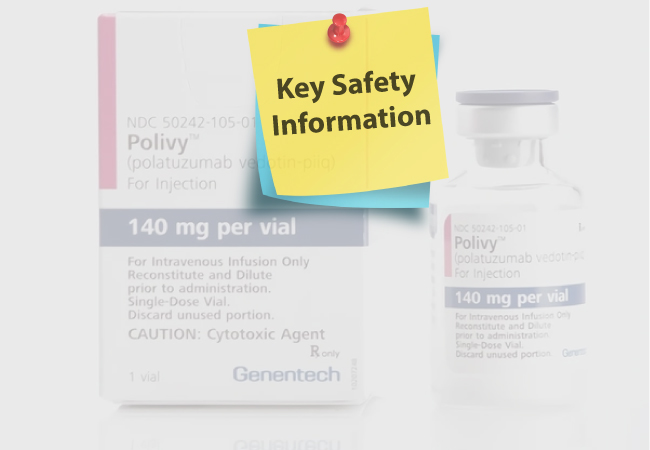Polivy (polatuzumab vedotin-piiq) is an important medication used in the treatment of certain types of cancer, particularly relapsed or refractory diffuse large B-cell lymphoma (DLBCL). However, it’s essential to understand the safety information and indications associated with Polivy to ensure safe and effective treatment.
Indications:
Polivy is indicated in combination with other medications for the treatment of adult patients with relapsed or refractory DLBCL who have received at least two prior therapies. It is not recommended for use as a single agent.
Important Safety Information:
- Risk of Adverse Reactions: Polivy can cause severe adverse reactions, including infusion-related reactions, myelosuppression (decreased blood cell production), infections, hepatotoxicity (liver damage), and progressive multifocal leukoencephalopathy (a rare brain infection). Close monitoring and appropriate management are essential to mitigate these risks.
- Infusion-Related Reactions: Patients receiving Polivy may experience infusion-related reactions, such as fever, chills, nausea, and hypotension (low blood pressure). Pre-medication with antihistamines and corticosteroids may help reduce the risk of these reactions.
- Myelosuppression: Polivy can lead to decreased blood cell counts, including neutropenia (low levels of neutrophils), thrombocytopenia (low platelet count), and anemia (low red blood cell count). Regular monitoring of blood counts and appropriate dose adjustments or treatment interruptions may be necessary.
- Infections: Patients treated with Polivy are at increased risk of developing infections, including opportunistic infections such as Pneumocystis jirovecii pneumonia (PCP) and cytomegalovirus (CMV) infection. Prophylactic treatment for PCP and CMV may be considered in high-risk patients.
- Hepatotoxicity: Liver damage, manifested as hepatocellular injury, liver enzyme elevations, and hepatic failure, has been reported in patients receiving Polivy. Monitoring of liver function tests is recommended during treatment, and dose adjustments may be necessary in patients with hepatic impairment.
Conclusion:
Polivy is an important medication for the treatment of relapsed or refractory DLBCL, but it comes with important safety considerations. Understanding the indications and safety information associated with Polivy is crucial for healthcare providers and patients to ensure safe and effective treatment outcomes. Close monitoring, appropriate management of adverse reactions, and adherence to recommended protocols are essential for optimizing the use of Polivy in clinical practice.
Reference:
https://www.polivy.com/newly-diagnosed/rchp.html






